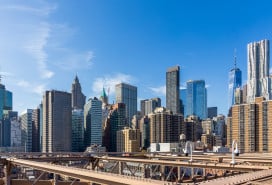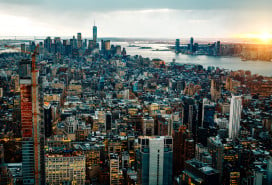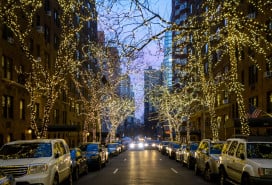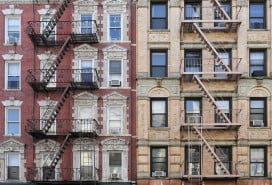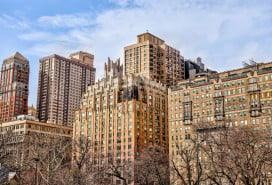Hoboken411: Hard-partying 20-somethings make way for young families

Hoboken has been referred to by some as the sixth borough of NYC. New Yorkers may scoff at this (especially if you've been stranded in Hoboken late-night and are forced to take a $60 taxi ride back to Manhattan), but with its close proximity and easy access PATH train service to lower Manhattan, Union Square and Midtown (during normal business hours anyhow), along with ferry service, this New Jersey city is arguably more convenient than parts of Brooklyn.
Perry Klaussen has been a resident of Hoboken for nearly 20 years and loves the neighborhood so much he might not ever leave. But he's not convinced that the sixth borough is a fair nickname.
"We don’t have as many high rises, diverse culture or the great public transport [as New York City]. However, I consider to Hoboken to be an extremely easy walking city," he says.
Wondering whether Hoboken is a good fit for your budget, commute and lifestyle? Triplemint's Gold Coast Guides are standing by to answer your questions. They'll help you figure out whether Hoboken, Jersey City, Weehawken or another Gold Coast town makes the most sense for you, and show you apartments that fit your needs. Click here to speak to a Triplemint Gold Coast Guide or view apartments online. >>
Klaussen founded his blog Hoboken411 in 2006 initially as an area business review site--kind of like Yelp--with a rating system and reviews of local establishments.
But since then the blog has grown considerably, Hoboken411 has broadened its focus to cover the local social scene, quality of life issues like crime, politics and regularly offers opinionated pieces from Klaussen himself, who is not afraid to ruffle a few feathers.
1. What would you tell someone moving in?
Single people (under 35) would definitely prefer the downtown area, with more affordable rentals and condos, with closer proximity to the PATH station, NJ Transit trains and downtown ferry slip. There's a larger concentration of bars and late-night pizza places too--much more action in general.
Some spots in town are a zoo on the weekend. Downtown neat the PATH station on a hot summer night at 2:30 a.m. when bars let out--you can safely bet that at least a few street scuffles will break out--and you'll see police action. I'd put my money on it.
For a family, there are options all over the city (bigger condos exist citywide), and larger upscale brownstones are generally known to be uptown. But a family would want to consider proximity to parks (Elysian Park and Church Square Park are particularly kid-friendly). Most of the waterfront condominium buildings have on-site parking (and even day care) which I’d consider a plus.
But one thing I’d tell everyone about are the “gotchas” that might hurt their quality of life. Parking rules... all sorts of parking rules, including and not limited to alternate-side parking, parked cars getting smashed by hit & run drunk drivers, parking too close to intersections ... I could go on.
I'd also cover ridiculous processes at City Hall. ... Our government is sort of screwy. Parking Utility is a mess. They can’t handle emergencies or storms. The roads are the worst in the country in my opinion.
But they seem to care more about “parks” before they fix the flooding, crime and other real-world quality of life issues. On top of that--unnecessary fees, excess micro-management, political in-fighting, countless lawyers, lawsuits and more that are quite embarrassing to watch. In general, you’re never too far away from yet another gaffe coming out of our City Hall. Almost comical.
2. Where are the best deals in the neighborhood in terms of real estate? What about in terms of dining/entertainment?
Waterfront condos cost a lot more than cookie cutter buildings closer to the housing projects. Single building condos (usually eight to 12 units) are the best deal in my opinion. Less monthly maintenance, and much more affordable. Much of the time you’ll get more living space as well.
As far as dining/entertainment: Someone who enjoys drinking and eating out a lot might consider living closer to restaurants, which are really all over the city. Others who don’t want the associated noise and drunken antics may want to find a more residential area. Keep in mind, though, that there are no true “residential only” neighborhoods.
At the moment, my favorite place to eat for a good deal is BBQ at Legal Beans, which just recently re-opened after Hurricane Sandy. They offer a buffet of various barbecued meats, salads and other prepared dishes for just $10. The brisket is to die for. Melts in your mouth.
Every restaurant has specials, and I recommend BYOB places for those that enjoy drinking on the cheap. My favorites are San Giuseppe (Italian kitchen with coal brick oven) – great owners and top-rated food, and Anthony David’s (one of the best in town, with great wait-staff too!). A community favorite is Mexican restaurant Charrito’s (with two locations)...one of the few places you can regularly witness a wait OUTSIDE the establishment.
And for families – some places have discounted (or free) kids nights, like Arthur’s Steakhouse, Elysian Café and Village Pourhouse.
3. What's the most coveted location within the neighborhood to live?
If money was no object, most people would want to live on the upscale streets uptown – like Hudson Street, Bloomfield Street and Garden Street. Many seven-figure brownstones are in close proximity to parks and the waterfront.
You can also argue that any building on the waterfront with “a view” is considered coveted as well. Some other spots include those close to transportation. On-site parking might also be considered a huge plus, too.
4. Is there a dream building in the neighborhood?
There are many places that are considered “urban mansions,” especially the brownstones uptown – sometimes exceeding 6,000 square feet. Single family homes with a backyard, too. But to pick one single building would be tough. There's a lot of historical and architectural charm to be had in Hoboken.
5. Any buildings that feel out of place with the feel of the neighborhood?
Not really. There are some that don’t match--but for the most part that is what you get in a city. Frankly, I’d say that abundance of “cookie cutter” condo buildings that all look the same is something I would change.
Many of the older buildings have excellent styling, but most of the newer properties (multi-unit) are drab in comparison. Perhaps one-click above low-income housing.
Take a look along the waterfront uptown. All the buildings look the same. No unique architecture.
6. Any real estate related controversy brewing or currently happening in the neighborhood?
We have one ongoing at the moment in regards to rent control. Hoboken had a very tenant-friendly rent control ordinance that allowed tenants to potentially hurt landlords...some landlords went broke because they ended up paying tenants who had moved out years ago.
There is a famous documentary about Hoboken rentals called “Delivered Vacant” in which some tenants were literally burned out of their apartments, allegedly via arson.
The property owners are looking to reform the rent control ordinance to make it more fair and limit liability. It’s a heated battle that has Hoboken divided. The folks paying pennies for rentals vs. the so-called “greedy” property owners. It’s disgusting, really. Why they can’t figure out an agreeable middle-ground is beyond me. It’s in court now.
Another issue is the exorbitant property taxes. This city has a well over $100 million dollar budget and the property taxpayers are paying for a whole lot of nothing. Roads and piers collapsing, routine flooding, short-staffed police department, increasing crime. Would you want to pay $25k a year for that? Even the garbage hauling has gone downhill. But we have new swing-sets coming, that should make everyone feel all warm and fuzzy.
7. How has the neighborhood changed in the past five years? Any projections on how it will change in the next five?
One thing stands out: Parents and children. You cannot walk a block on the main street during the day without bumping into one or more strollers (moms, nannies, etc). That’s certainly not a problem on its own, but it’s noticeable, and brings with it a whole bag of potential issues--etiquette, common courtesy, entitlement–the works.
8. What do you think your "sister" neighborhood might be?
Red Bank, NJ, has similar demographics, size and social life. You might consider some parts of Brooklyn and Jersey City similar to Hoboken, too. But in the end it’s rarely apples to apples with all the nuances that make each place unique.
9. Which neighborhood feels like the opposite of your neighborhood?
Almost no city is like Hoboken. With its density, unique demographic (mostly white – surrounded by mostly other ethnicities), and proximity to NYC, etc. An opposite city would be some tiny town in the middle of nowhere. Or a paradise island...
10. Would you stay in this neighborhood forever if you could?
Yes and no. There are pros and cons with everything. If I had to pick an urban environment to live in, however, Hoboken would be it. It has the relatively low-key aspects of a smaller city--but with plenty of action-packed “city life” available within, or nearby.
11. What is one of the biggest misconceptions about the neighborhood?
That it is party town. Fifteen years ago it was much more of a party town. And there was nothing really wrong with that. The town was 30 percent less populated, too.
Since then, the population has skyrocketed to over 50k (I bet it will easily be 60k to 70k by the 2020 census). The city appears to have gone much more “upscale” than just sports bars and beer. We have wine bars, tapas, ethnic restaurants taking the place of the dive bars of the past.
But don’t get me wrong – come to Hoboken in March – you will still see moronic behavior from college party kids and frat-guy types. Listen to what Howard Stern said after reading Hoboken411: http://hoboken411.com/archives/60760
12. Hoboken411 was a go-to information website for Hoboken residents during and after hurricane Sandy, getting over a million hits after the storm. How was the neighborhood impacted by Sandy? Has it bounced back?
Hoboken was impacted greatly. There was widespread, long-term power outage and it was a major commuting hub knocked out. And of course, the massive flooding was the big story.
Hoboken is known for flooding even during brief summer deluges. Nearly 80 percent of Hoboken is considered a FEMA “flood zone,” some spots more notorious than others. There were countless business closures (especially downtown and on the western edge), and hundreds of residential basements badly damaged.
We’re not 100 percent yet, but almost there. Some businesses never came back. However, to the untrained eye six months after the storm, you’d have to ask where the flooding and damage was.
It changed the neighborhood briefly--when everyone was desperate for “charge” on their cell phone. The few places that had power served the community well. Life has gone back to normal otherwise. But there are always opportunists who glom on the fear and urgency of the next “superstorm,” and many are speaking about this as if it’s going to be a regularly occurring event.
Hoboken has been here for a long time, and through many extreme events.
See all Confessions of a Neighborhood Blogger
Related posts:
Moving to NYC? Here's a crash course in finding an apartment here
A move-by-move neighborhood guide for the people, by the people
Williamsburg to Jersey City: From one perceived stereotype to another


